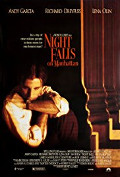
Directed by
Sidney Lumet
113 minutes
Rated M
Reviewed by
Bernard Hemingway

Night Falls On Manhattan
Night Falls on Manhattan takes a while to find its feet. It starts off looking like a drug wars movie, then a courtroom drama before settling into its main concern, a police corruption investigation given focus by a father-son relationship.
Sidney Lumet’s film, which he also wrote based on a novel by Robert Daley (Lumet had previously filmed the latter's novel 'Prince Of The City"'in 1981) tells story of Sean Casey (Andy Garcia), an idealistic young man who has left the police force to try his hand as a lawyer in the DA’s office. The first case he tries is that of a black drug dealer (Shiek Mahmud-Bey), who shot Seans's father, Liam (Ian Holm), an old school career cop nearing retirement in a bust gone wrong. Sean gets a conviction but during the trial allegations of police corruption are raised by the Alan Dershowitz-like defense attorney, Sam Vigoda (Richard Dreyfuss). By a twist of fate Sean gets elected D.A. but an internal affairs investigation implicates his father and his father’s partner (James Gandolfini) in the corruption scandal.
Although all the main elements of the story we have seen before - the working class stick-together ethos of the NYPD that behind the veneer of brobity is also a breeding ground of corruption, the political manoeuverings at the DA’s, an affair with a sexy rival lawyer (Lena Olin), the memory of the sainted deceased mother/wife and so on - Lumet assembles his ingredients smoothly and shapes them tidily with a well-defined moral that, in case you missed it Sean articulates at the film’s end.
Why however Andy Garcia with his Latin looks was cast as an Irish American, or for that matter Ian Holm as his Irish American Dad (they don’t even talk alike, let alone look alike), is a mystery. Night Falls on Manhattan is a mildly engaging foray into the type of territory that Lumet has explored with much greater effectiveness notably in Serpico (1973) and The Verdict (1982).
Want something different?





